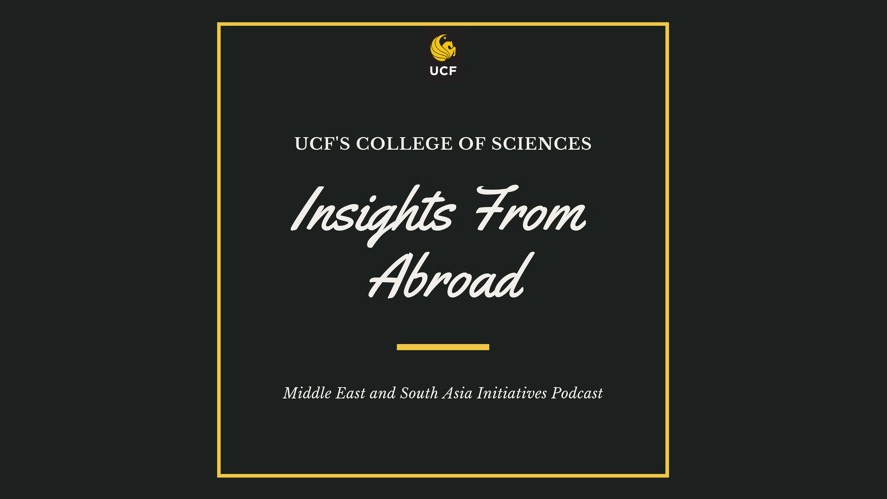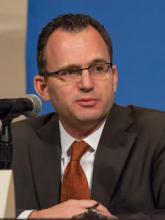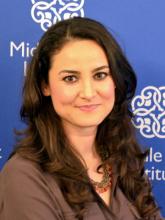Interview – Amberin Zaman

We had the pleasure of interviewing Amberin Zaman, a prominent Turkish journalist who focuses on Turkey and minority rights issues in Turkey. She discussed various issues and answered questions posed by our PhD candidate Christopher Faulkner.
The Middle East in the Donald Trump Era
On October 26th, 2017, Dr. Paul Salem and Dr. Gönül Tol participated in a panel discussion on the implications and effects that Donald Trump’s ongoing presidency has had or could have on the region, covering specific places such as Syria and Turkey. Biographies on the two panelists can be found below.
Dr. Paul Salem

Vice President, MEI Policy Analysis, Research and Programs
Author of Broken Orders: The Causes and Consequences of the Arab Uprisings
Founding Director, Carnegie Middle East Center in Beirut
Dr. Gönül Tol

Director, MEI Center for Turkish Studies
Adjunct Professor, George Washington University’s Institute for Middle East Studies, National Defense University
Expert on U.S.–Turkish relations and Turkish politics
A previously-live video can be found on FaceBook here.
The Food Security Factor
Innovation and Investment in MENA Region Food Security
How will the Middle East and North Africa region meet the growing demand for food? What are the implications of the current political environment in the region on food security? What type of planning is needed and how can better policies be implemented? To answer these pertinent questions, the Hollings Center for International Dialogue, together with the University of Central Florida and Al Akhwayan University in Morocco, recently hosted a dialogue called
The Food Security Factor: Stability, Governance, and Development Choices. The dialogue looked at food security throughout the MENA region as part of a series of dialogues that look at resource challenges throughout the Middle East. Following this meeting, we conducted several video interviews on some of the topics of the dialogue. Links to these videos can be found below.
Ismahane Elouafi, Director General of the International Center for Biosaline Agriculture, discusses the innovation solutions that could be applied to improving food security in the Middle East & North Africa. She focuses on deploying small scale technological innovations, the importance of learning from older techniques, and the utilization of local, native crop varieties.
Food Security in the Middle East & North Africa
Martin Keulertz, Assistant Professor at the American University of Beirut, discusses the challenges the MENA region faces in achieving food security and discusses possible ways to address those challenges. Most importantly, the outlook can be optimistic with attention to key issues and the development of new strategies.
Food Security Challenges and Practices in the MENA Region
Jeannie Sowers, Associate Professor of Political Science at the University of New Hampshire, discusses some of the obstacles to food security in the Middle East & North Africa, particularly the challenge of the inclusion of rural populations in food security strategies. She further highlights good examples from the region.
Click here to watch these and other videos from the Hollings Center.
Former US Dept. of State Official Owen Kirby Visits UCF

On March 1-3, 2017, the Prince Mohammad bin Fahd Program for Strategic Research and Studies hosted guest speaker Mr. Owen Kirby. Kirby formally worked at the State Department as an international political consultant and is still an active member in international relations. He participated in a variety of events at the University of Central Florida (UCF).
Owen Kirby has two decades of experience in international relations, specializing in political party development, public opinion polling, and elections. Currently working with clients and partners in the Middle East region, Kirby served in the U.S. Department of State as a Senior Adviser in the Bureau of Near Eastern Affairs (2004-2009), and as a Senior Governance Advisor in Kandahar Province, Afghanistan, 2009-2010. More recently, he has advised leaders in Lebanon and the Palestinian Authority.
Kirby met with students on a personal level to discuss current events, his extensive experience with the United States government as a state advisor, Middle Eastern affairs, and advised students who want to pursue a career in international relations. Kirby held a discussion-based and question-driven meet with students of the International Relations Club of UCF where he focused on the Middle-Eastern region. Kirby participated in an interview held by UCF students, Yrainy Artigas and Halla Kouatli, where he discussed the issues the Middle East currently faces and “going beyond the headlines.”
Photos of Kirby’s visit with students can be seen here.
Former Congressman Bob Clement Visits Orlando

Former U.S. Congressman Bob Clement visited Orlando March 6th – 8th. Clement, a longtime friend to UCF and the PMBF program, served in the U.S. House of Representatives for 15 years beginning in the late 1980s.
Prince Mohammad Bin Fahd Program for Strategic Research & Studies Website Launch- Special Visit from Prince Mohammad bin Fahd bin Abdul Aziz
Focus KSA: A Conversation with David Dumke, Director, PMBF Program
Tolerance in Education Symposium
The Prince Mohammad Bin Fahd Program hosted “Teaching Tolerance & Peace in Education: American Experiences & International Lessons” on March 27. The symposium, funded in part by a grant provided by the Association of International Education Administrators, brought together civic, education, and business leaders from the local, state, national, and international level to discuss the role of education as a catalyst for tolerance and peace in an increasingly globalized society. The event featured three topical sessions, each moderated by a renowned experts: Dr. James Gibson, Ph.D., of Washington University in St. Louis; Dr. Patricia Avery, Ph.D., of the University of Minnesota; and Dr. Peter Levine, Ph.D., of Tufts University. A forth panel featured community leaders dedicated to finding ways to bring a diverse community together through education. A postmortem assessment was made which described different approaches to peace and tolerance in education, identified projects/programs which promote the concepts, and explained how concepts could be applied internationally, particularly in the Middle East-North African region.


